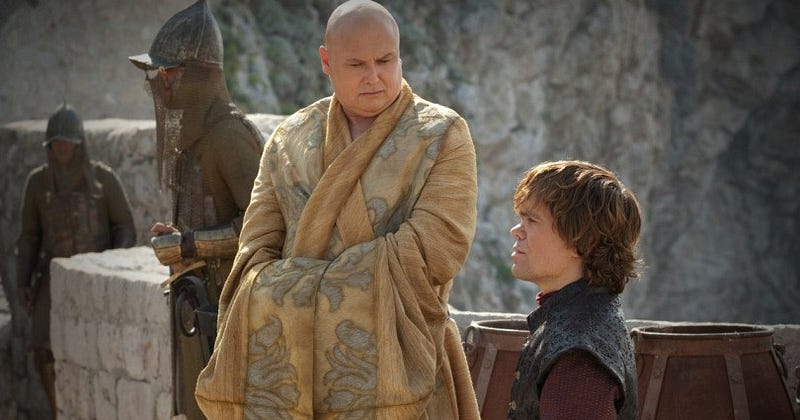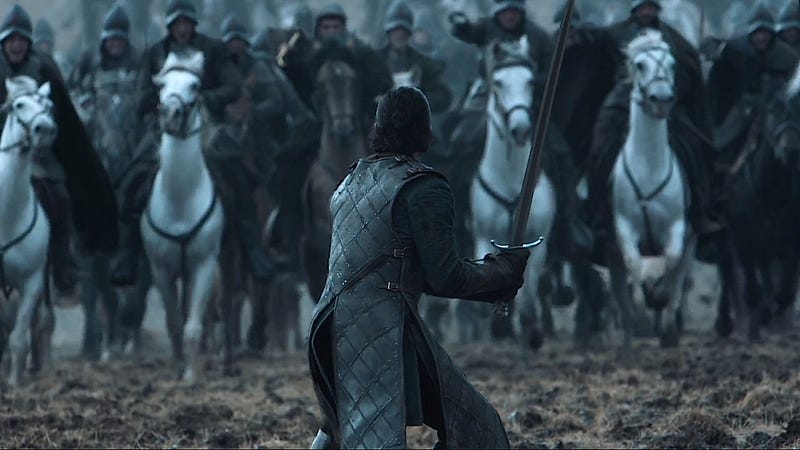Winter was here.
I’m longing for George R. R. Martin to finally publish his 6th book on the installments of The Song of Ice and Fire.
Or;
The HBO producers could start season 8 early. Whichever comes first.
The world of Westeros has forced me to split my time evenly nowadays between the world we are living in, and the realm of the Seven Kingdom. I made speeches (yes, twice) at Kebayoran Toastmasters Club explaining: the leadership lessons that the installment of Game of Thrones has to offer, as well as other ultimate reasons why everyone should read the book or at least watch the series.
There are countless takeaways that could be applied to our real world. The lessons learnt from reading the book or watching the series should inspire countless individuals who aspire to become a king in their own realm.
1. Everyone ought to learn how to follow before becoming a leader
Jeor Mormont was the 997th Lord Commander of the Night’s Watch. During season two of the series, the Night’s Watch brothers lead by him confronted an obnoxious ally. Craster, the member of Free Folk who live beyond the wall with his daughters whose also his wives (yes, he marries his daughters and has no sons on purpose), noticed how his way of life is despised by Jon Snow. Shortly after Jon Snow provoked him, Jeor Mormont reprimanded Jon and gave a leadership advise to our beloved bastard-from-the-North-turned-to-be-the-rightful-heir-to-the-realm.

“You want to lead one day? Well, learn how to follow.” — Jeor Mormont
In business, almost everybody started-off as a follower before ascending to becoming a leader. Many of us started as a low-level employee. As time goes by, we comes to understand the value that we give to our employers, why do we get paid for what we do, and if our value to the business have tarnished overtime.
Not everyone can be a good leader. But anyone could learn how to become a good leader. The best way to learn is to start out by following someone or people who you think you would want to be. Say for example, you want to become like Richard Branson, you would want to work for him directly so you can see what he does on daily basis, how he run his empire, and how he lead his team.
2. Your Word Should be as Good as Gold
There are many instances when promise were made…and broken as fast as ice melts in the dessert. Rob Stark is the easiest example that came to mind. He made a promise to marry one of Walder Frey’s many daughters in exchange for the access for the Northmen to cross The Green Fork of the Trident River. His fate was sealed during the infamous Red Wedding, which still is the saddest event (the Hodor one tops my list).
How did Robb Stark pay for this error? death.

You’d like to keep your word as good as gold. Meaning that anyone could rely on what you say. If you promise for example, to pay someone, well, then pay him or her. If you promise to get something done for the company, well, get it done.
We all live by reputation. Warren Buffett famously quoted the importance of reputation in his line of business: “It takes 20 years to build a reputation and five minutes to ruin it” and encourage his managers to always focus on reputation.
When enough people make false promises, words stop meaning anything — Jon Snow
3. Surround Yourself with a Good Team
Daenarys Targaryen was a baby when Robert’s rebelled against her father, King Aerys II aka the Mad King. Ever since the overthrown of the Mad King, she was living in exile in the foreign land of Essos. With his brother, Viserys, they both aspired to return to Westeros, where they were born and reclaimed their birthrights of the throne. Ever since, her only concern and goals has always been sitting on that iron chair and restoring the past glory of her family house, despite all resources to support their claims were non-existent when she first started.
Fast forward to the current storyline, the Mother of Dragons now has the best team and allies in supporting her claim of the Iron Throne. We could safely say that she has all the best there is within the realm: The Dothraki Screamers, The Unsullied, two adult-sized Dragons, Jorah Mormont, Tyrion Lannister, Lord Varys, Missandei, and also the Northerners lead by Jon Snow.

In a thriving businesses, leaders are surrounded by their own A-Team. Good leaders attract all sort of talents required to achieve common goals. It is almost always a myth if there is any successful leaders ever lived achieved everything without the help of their teams.
4. “Power resides where men believe it resides.”
In the second book “A Clash of Kings”, Lord Varys had a conversation with Tyrion Lannisters which is strikingly interesting concerning the topic of power. He started with a riddle:
“In a room sit three great men, a king, a priest, and a rich man with his gold. Between them stands a sellsword, a little man of common birth and no great mind. Each of the great ones bids him slay the other two. ‘Do it,’ says the king, ‘for I am your lawful ruler.’ ‘Do it,’ says the priest, ‘for I command you in the names of the gods.’ ‘Do it,’ says the rich man, ‘and all this gold shall be yours.’ So tell me — who lives and who dies?”
After hearing Tyrion’s answer: “depends on the sellsword”, Lord Varys then continued on by saying: “ If power lies with the men who carry swords, why do we pretend that kings hold the power?”
Power, he argues, is a shadow — hence “power lies where we think it lies”.

Great leaders lead and communicate their visions to the people. It is up to the people whether or not these leaders will be granted “power” to lead them. Birthright, tenure, nor position would not guarantee leaders to have powers over their people.
5. Lead By Example
In the “Battle of Bastards”, Jon Snow lead his troops to the front line (although carelessly), against the Bolton’s army lead by Ramsey Bolton. Jon charged ahead and showed a display of bravery to the army who fought with him in the battle, whilst Ramsay, was staying behind and watching the battle in safety.
During the meeting of the two sides hoping for truce prior to the battle, they agreed on one thing: many people don’t have to die because of the forthcoming battle. Instead, Jon challenged Ramsey to settle the difference matter “the old way”, meaning a one-on-one swordfight. Ramsay declined by quoting that Jon has the reputation of being a good swordsman, and he’s not sure that he’ll beat him in a one-on-one combat. But he was sure of one thing, the Bolton’s army will beat Jon’s because it has double the number. To which Jon replied:
Will your men fight for you, when they hear you wouldn’t fight for them? — Jon Snow

A leader must prepare to do many inconvenient tasks and get their hands dirty. Action, indeed, speaks louder than any command or flowery words. We have all been there. We have seen, leaders who won’t risk their own safety and convenience for the sake of achieving common goals which would eventually benefit everyone involved. Sometimes, loyalty does not lie on gold or fear alone. Loyalty will be rewarded to great leaders who can give guidance to lead a better life of its followers.
6. Endless Effort to Display Superiority, Erode One’s Authority
When the boy king Joffrey Baratheon (or rather…Lannister) had to ensure everyone over and over and over again that he’s the king of the seven kingdom. He keeps telling everybody that he’s the rightful king of Westeros, on every single occasion he had. At one moment during a small council meeting, he erupted and reminded everybody including his powerful grandfather and his mother once more, that he is in fact, the king. To which Tywin replied:
“Any man who must say, “I am the king”, is no true king.” — Tywin Lannister
In the end, as we would all agree, Joffrey Baratheon went down as the one of the worst king who ever ruled the Seven Kingdom.

Life is politic, which made up of people of whom playing it well and playing it poorly. Some players would be eager to show off their statuses, wealth, or the achievement of their fathers in order for people to follow his/her bidding. It is an unwise move, to say the least. People don’t just follow because you hold a certain status or position.
So, what’s your favorite leadership lessons from Westeros?
First published in Nov 11, 2017 in medium.com


